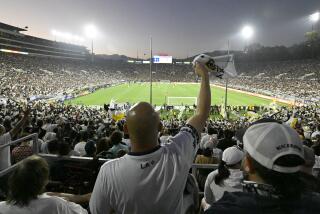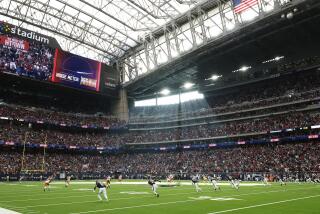Goal Size to Remain the Same, FIFA Rules
- Share via
Major League Soccer’s attempt to increase the size of the goal died a quick death Saturday in Rio de Janeiro, where world soccer leaders unanimously rejected the idea.
The possibility of enlarging the goal had been raised last year in discussions by FIFA, which governs world soccer. MLS in February said it would be interested in experimenting with the concept.
But worldwide reaction was so negative that the International Board, soccer’s rule-making body, dismissed the idea at its annual meeting in Brazil.
“The reaction was such that the board felt it was inappropriate to even consider the matter in more detail,” said board member Graham Kelly of England, who added that it had never been more than a “tentative suggestion,” to begin with.
Since 1865, the goal has measured 24 feet wide by eight feet high. The suggestion had been to increase the width by 18 inches and the height by nine inches, but critics around the globe had ridiculed the idea as tampering with the fundamental nature of the game.
“Similarly, we refused to discuss changing the size of the ball,” said Joseph “Sepp” Blatter, FIFA’s general secretary.
MLS officials, in Rio de Janeiro lobbying for the change, were unavailable for comment.
However, FIFA did announce several other changes, all of which will take effect July 1:
--It modified the advantage rule, allowing referees to let play continue after a foul occurs, provided the victimized team gains an advantage. Referees can later stop play and award the free kick if the advantage does not materialize.
“The best referees do this already,” Kelly said, “but we want all referees to do it.”
--It increased the number of substitutes allowed on the bench from five to seven. Only three can be used, however.
--It increased the responsibility of the fourth match official to include reporting disciplinary incidents to the referee after a match has finished.
--It refused to allow television replays to overturn decisions made on the field.
“Football is a human game and we have to live with errors; otherwise we would never finish leagues because we would have to play matches time and time again,” Blatter said.
“The board knows about existing technology. But football is played everywhere and we have to have one law for the game. We can’t have one law for those who can afford technology and another for those who can’t.”
--It approved continuation of an experiment in the Belgian second division, permitting the use of kick-ins instead of throw-ins.
It discontinued an experiment with timeouts in the Swedish first division. The concept, Blatter said, “drew mixed results, so we’re going to sit on this idea for a while.”
--It decided to rename linesmen “referee’s assistants,” in part because of the increasing number of female linesmen.
More to Read
Go beyond the scoreboard
Get the latest on L.A.'s teams in the daily Sports Report newsletter.
You may occasionally receive promotional content from the Los Angeles Times.







